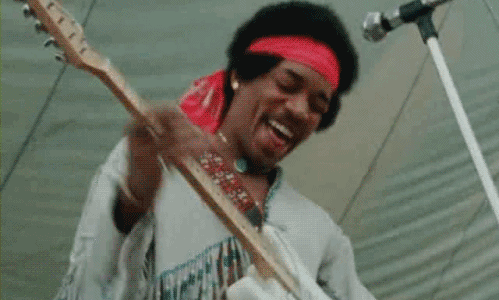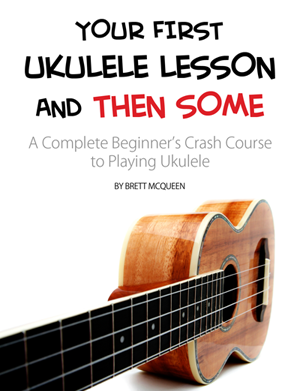I am left-handed and I’ve been playing ukulele for over 20 years.
But I don’t play left-handed.
Well, technically, I use my left hand all the time when I play ukulele, but I don’t play “left-handed” in the traditional sense, and if you’re a lefty, I don’t think you should learn to play ukulele left-handed either.
To play left-handed, you use the left hand to strum and right hand to fret chords.
Many famous musicians have played their stringed instrument left-handed like Jimi Hendrix, Paul McCartney, or Justin Bieber.

The famous guitar player Jimi Hendrix shredding his left-handed guitar using the left hand to strum and right hand to fret chords
This is opposite to playing ukulele right-handed, the most common way, where you use the right hand to strum and left hand to fret chords.
If you’re a brand new lefty ukulele player and trying to decide to learn “left-handed” or “right-handed”, here are my two main reasons for why I tell new students to learn to play ukulele “right-handed” even if you’re a lefty and the two exceptions to consider.
Reason #1: Equal Use of Your Dominant and Non-Dominant Hand is Required to Play Ukulele
If you’re a lefty, it’s a bit of a myth to think learning to play left-handed will be easier for you.
This is because equal use of your dominant hand (your left hand if you’re lefty) and non-dominant hand (your opposite hand) is required to play ukulele. There’s never a time where you’re using your left hand more than your right hand or vice versa when playing. To play the ukulele, it’s a 50/50 split using both hands.
In fact, I believe lefties have a distinct advantage in learning the ukulele “right-handed”, where you use the left hand to fret chords and right hand to strum, because as a lefty, chances are you’ve already built a degree of dexterity in your left hand that doesn’t exist in your right hand simply because you write with your left hand. This slight edge can make fretting chords easier.
Now, I don’t want to make it sound like it will be a walk in the park. Chords will be a challenge to learn no matter what hand you use, but the point is, they won’t be significantly harder to learn using your left hand to fret chords and right hand to strum.
Reason #2: Learning “Right-Handed” Makes it Easier to Follow Instructional Material
What a lot of beginner lefties don’t consider is the fact that the majority of ukulele instruction, songbooks, chord diagrams, tabs, and scale diagrams, are taught from a “right-handed” perspective.
I know. It isn’t fair being a lefty living in a right-handed world.
This means if you decide to learn to play “left-handed” you have to do some more mental heavy-lifting to make the material compatible for your perspective. Some don’t mind this, but many find this to be burdensome and an additional barrier to learning to make music.
While I’ve added left-handed ukulele chord diagrams to the Ukulele Tricks Chord Library, you make it easier on yourself learning “right-handed” where you fret chords with the left hand and strum with the right hand.
And to be fair, some lefties who have joined me in the Strumming Tricks online video lesson course have told me they like how the video “mirrors” their fingers, but many left-handers who decide to learn to play “right-handed” are happy they went this route.
When You Should Learn to Play Ukulele “Left-Handed”
There are two specific cases where I recommend learning to play ukulele left-handed.
First, if you have a physical disability, missing fingers, or arthritis that prevents specific movement or functionality in your left hand, and your only option for playing ukulele is to use your left hand to strum and right hand to fret chords, then you absolutely should learn to play left-handed.
In this way, playing left-handed is your last resort option when you wouldn’t be able to play ukulele otherwise.
And secondly, if you already started to play ukulele left-handed and are achieving success, don’t change things now. In other words, if you’ve been playing left-handed for more than a week, continue on being a unique, one-of-a-kind, left-handed ukulele player.
One of the perks of being a left-handed player is that you’ll always stand out and be popular when playing with other musicians!

